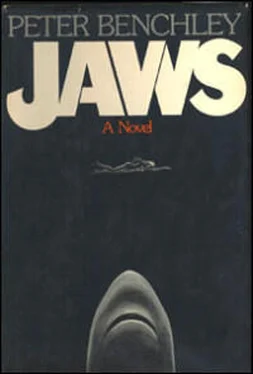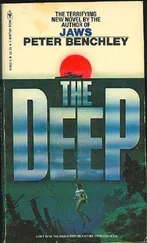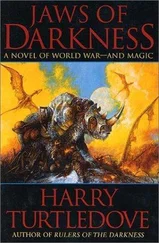Peter Benchley - Jaws
Здесь есть возможность читать онлайн «Peter Benchley - Jaws» весь текст электронной книги совершенно бесплатно (целиком полную версию без сокращений). В некоторых случаях можно слушать аудио, скачать через торрент в формате fb2 и присутствует краткое содержание. Город: New York, Год выпуска: 1973, Издательство: Doubleday, Жанр: Триллер, на английском языке. Описание произведения, (предисловие) а так же отзывы посетителей доступны на портале библиотеки ЛибКат.
- Название:Jaws
- Автор:
- Издательство:Doubleday
- Жанр:
- Год:1973
- Город:New York
- ISBN:нет данных
- Рейтинг книги:5 / 5. Голосов: 2
-
Избранное:Добавить в избранное
- Отзывы:
-
Ваша оценка:
- 100
- 1
- 2
- 3
- 4
- 5
Jaws: краткое содержание, описание и аннотация
Предлагаем к чтению аннотацию, описание, краткое содержание или предисловие (зависит от того, что написал сам автор книги «Jaws»). Если вы не нашли необходимую информацию о книге — напишите в комментариях, мы постараемся отыскать её.
Jaws — читать онлайн бесплатно полную книгу (весь текст) целиком
Ниже представлен текст книги, разбитый по страницам. Система сохранения места последней прочитанной страницы, позволяет с удобством читать онлайн бесплатно книгу «Jaws», без необходимости каждый раз заново искать на чём Вы остановились. Поставьте закладку, и сможете в любой момент перейти на страницу, на которой закончили чтение.
Интервал:
Закладка:
“I know it, Larry,” Brody said softly. “And as far as I know, there’s not a damn thing we can do about it. Good night.” He hung up the phone.
Meadows and Hooper rose to leave. Brody walked them to the front door of the station house, As they started out the door, Brody said to Meadows, “Hey, Harry, you left your lighter inside.” Meadows started to say something, but Brody stepped on his words. “Come on back inside and I’ll give it to you. If you leave it around here overnight, it’s likely to disappear.” He waved to Hooper. “See you.”
When they were back in Brody’s office, Meadows took his lighter from his pocket and said, “I trust you had something to say to me.”
Brody shut the door to his office. “You think you can find out something about Larry’s partners?”
“I guess so. Why?”
“Ever since this thing began, Larry has been on my ass to keep the beaches open. And now, after all that’s just happened, he says he wants them open for the Fourth. The other day he said he was under pressure from his partners. I told you about it.”
“And?”
“I think we should know who it is who has enough clout to drive Larry bullshit. I wouldn’t care if he wasn’t the mayor of this town. But if there are people telling him what to do, I think we ought to know who they are.”
Meadows sighed. “Okay, Martin. I’ll do what I can. But digging around in Larry Vaughan’s affairs isn’t my idea of fun.”
“There’s not a whole hell of a lot that is fun these days, is there?”
Brody walked Meadows to the door, then went back to his desk and sat down. Vaughan had been right about one thing, he thought: Amity was showing all the signs of imminent death. It wasn’t just the real estate market, though its sickness was as contagious as smallpox. Evelyn Bixby, the wife of one of Brody’s officers, had lost her job as a real estate agent and was working as a waitress in a hash house on Route 27.
Two new boutiques that were scheduled to open the next day had put off their debuts until July 3, and the proprietors of both made a point of calling on Brody to tell him that if the beaches weren’t open by then, they wouldn’t open their stores at all. One of them was already looking at a site for rent in East Hampton. The sporting goods store had posted signs announcing a clearance sale — a sale that normally took place over the Labor Day weekend. The only good thing about the Amity economy, as far as Brody was concerned, was that Saxon’s was doing so badly that it laid off Henry Kimble. Now that he didn’t have his bartending job, he slept during the day and could occasionally survive through a shift of police work without a nap.
Beginning on Monday morning — the first day the beaches were closed — Brody had posted two officers on the beaches. Together, they had had seventeen confrontations with people who insisted on swimming. One was with a man named Robert Dexter, who claimed a constitutional right to swim off his own beach and who allowed his dog to terrorize the officer on duty, until the cop pulled his pistol and threatened to shoot the dog. Another dustup took place on the public beach, when a New York lawyer started reading the United States Constitution to a policeman and a multitude of cheering youths.
Still, Brody was convinced that — so far, at least — no one had gone swimming.
On Wednesday, two kids had rented a skiff and rowed about three hundred yards offshore, where they spent an hour ladling blood, chicken guts, and duck heads overboard. A passing fishing boat spotted them and called Brody via the marine operator. Brody called Hooper, and together they went in Flicka and towed the boys to shore. In the skiff the boys had a flying gaff attached to two hundred yards of clothesline, secured to the prow by a square knot. They said they planned to hook the shark with the gaff and go for a “Nantucket sleigh ride.” Brody told them that if they ever tried the stunt again, he’d arrest them for attempted suicide.
There had been four reports of shark sightings. One had turned out to be a floating log. Two, according to the fisherman who followed up the reports, were schools of jumping bait fish. And one, as far as anyone could tell, was a flat nothing.
On Tuesday evening, just at dusk, Brody had received an anonymous phone call telling him that a man was dumping shark bait into the water off the public beach. It turned out to be not a man, but a woman dressed in a man’s raincoat — Jessie Parker, one of the clerks at Walden’s Stationery Store. At first she denied throwing anything into the water, but then she admitted that she had tossed a paper bag into the surf. It contained three empty vermouth bottles.
“Why didn’t you throw them in the garbage?” Brody had asked.
“I didn’t want the garbage man to think I’m a heavy drinker.”
“Then why didn’t you throw them in someone else’s garbage?”
“That wouldn’t be nice,” she said. “Garbage is… sort of private, don’t you think?”
Brody told her that from now on, she should take her empty bottles, put them in a plastic bag, put that bag in a brown paper bag, then smash the bottles with a hammer until they were ground up. Nobody would ever know they had been bottles.
Brody looked at his watch. It was after nine, too late to pay a visit to Sally Gardner. He hoped she was asleep. Maybe Grace Finley had given her a pill or a glass of whiskey to help her rest. Before he left the office, he called the Coast Guard station at Montauk and told the duty officer about Ben Gardner. The officer said he would dispatch a patrol boat at first light to search for the body.
“Thanks,” said Brody. “I hope you find it before it washes up.” Brody was suddenly appalled at himself. “It” was Ben Gardner, a friend. What would Sally say if she heard Brody refer to her husband as “it"? Fifteen years of friendship wiped out, forgotten. There was no more Ben Gardner. There was only an “it” that should be found before it became a gory nuisance.
“We’ll try,” said the officer. “Boy, I feel for you guys. You must be having a hell of a summer.”
“I only hope it isn’t our last,” said Brody. He hung up, turned out the light in his office, and walked out to his car.
As he turned into his driveway, Brody saw the familiar blue-gray light shining from the living room windows. The boys were watching television. He walked through the front door, flipped off the outside light, and poked his head into the dark living room. The oldest boy, Billy, lay on the couch, leaning on an elbow. Martin, the middle son, age twelve, lounged in an easy chair, his shoeless feet propped up on the coffee table. Eight-year-old Sean sat on the floor, his back against the couch, stroking a cat in his lap. “How goes it?” said Brody.
“Good, Dad,” said Bill, without shifting his gaze from the television.
“Where’s your mom?”
“Upstairs. She said to tell you your dinner’s in the kitchen.”
“Okay. Not too late, Sean, huh? It’s almost nine-thirty.”
“Okay, Dad,” said Sean.
Brody went into the kitchen, opened the refrigerator, and took out a beer. The remains of the pot roast sat on the kitchen table in a roasting pan, surrounded by a scum of congealed gravy. The meat was brownish-gray and stringy. “Dinner?” said Brody to himself. He checked the icebox for sandwich makings. There was some hamburger, a package of chicken legs, a dozen eggs, a jar of pickles, and twelve cans of soda pop. He found a piece of American cheese, dried and curled with age, and he folded it and popped it into his mouth.
He debated heating up the pot roast, then said aloud, “The hell with it.” He found two pieces of bread, spread mustard on them, took a carving knife from a magnetic board on the wall, and sliced a thick slab of roast. He dropped the meat on one of the pieces of bread, scattered a few pickles on top of it, covered it with the other piece of bread, and mashed the sandwich down with the heel of his hand. He put it on a plate, picked up his beer, and climbed the stairs to his bedroom.
Читать дальшеИнтервал:
Закладка:
Похожие книги на «Jaws»
Представляем Вашему вниманию похожие книги на «Jaws» списком для выбора. Мы отобрали схожую по названию и смыслу литературу в надежде предоставить читателям больше вариантов отыскать новые, интересные, ещё непрочитанные произведения.
Обсуждение, отзывы о книге «Jaws» и просто собственные мнения читателей. Оставьте ваши комментарии, напишите, что Вы думаете о произведении, его смысле или главных героях. Укажите что конкретно понравилось, а что нет, и почему Вы так считаете.












